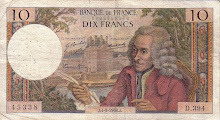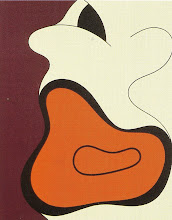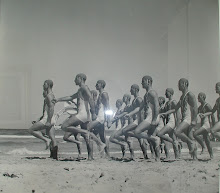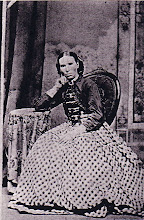'Hi' and 'Hey' - Intensifying Intimacy
I miscalculatedly 'Hey-ed' someone in the blogosphere the other day - and was savagely 'Dear-ed' back!
And I began to think about the issue.
Along with everyone else in the Anglophile universe, I invariably used to start letters and emails with the conventional 'Dear' greeting. For everyone - business and personal ... whatever. Life was easy!
Because of SMS-ing, chatroom chatting and blog posting, I realize that I've quite unconsciously added 'Hello', 'Hi' and 'Hey' to my repertoire of written greetings. With 'Hello' the most formal and 'Hi' the least? BTW, does 'Hello' sound totally deranged everywhere?!
Anyway, it felt great now being able to manage levels of intimacy. As I do in French with 'tu' ('you' for intimate friends) and 'vous' ('you' for everyone else). (Big 'tu' kiss to Ulysse!)
Then I recalled I'd not been traumatized by my 'intimacy error' in English.
As I might have been in French, which is viewed by Francophones as the not-to-be corrupted 'national treasure'.
I remember a French blog where a guy had posted he'd been talking to his 'bread lady' and things had moved from transactional to personal. And the woman asked "Tu t'ennuies pas trop?" ("Aren't you bored?") referring to his move to the countryside. The guy was flabbergast, replying "Est-ce qu'on se dit tu ou est-ce qu'on se dit vous ?" ("Do we say 'tu' or 'vous' to each other?"). Provoking the response "Je m'en fous" ("I don't give a fuck") - followed by them both laughing uproariously! Awful interpersonal tension being released.
In fact the same distinction used to be made in English - with 'thou' as the singular form ...

... and 'you' the plural form, for the second person nominative.
With 'thou' becoming an intimate form of 'you', up to the end of the Edwardian era.
It remains now in the language only in set expressions such as 'Holier than thou'. With curiously a new plural form appearing here recently in certain sociolects - "Are yous coming tonight?".
But back to 'hey' and 'hi'.
I just love being able to intensify intimacy with 'hey' - and it's become really natural to me now, having seemed a bit awkward and calculated at first.
Thank god for language change and evolution, hey!



![C18 Bronze Buddha [Southern China]](https://blogger.googleusercontent.com/img/b/R29vZ2xl/AVvXsEioLkgVKuhDoIHQgM1X6Oe2hGn75yqaj4OJXPmNpumXmQPKxB22S57YS5DVrl1P7zl7BS6EFpAtaNZPze7gzVCRiQI54bwdHhVa4fGr7NOChZwTZoo92gUen6tC5U8gWIy_pv92U0FB38M/s1600/Buddha+%255BBronze%252C+C18%252C+China%255D+1.jpg)













+1998+Cropped.jpg)












As regards Hello - I prefer the inverse of Oh Hell.
ReplyDeleteAlan down in Florida
Hey, there.
ReplyDeleteTu est une source de continuous most amusing/educating info.
I might take to calling you Tu as opposed to Vós (Portuguese, sure enough - but aren't all romance languages thus blessed?) Credo che sia vero, non solamente ben' trovatto.
Hooray for hey, hi, dearm tu e "oi" (not being rude, hust sending a further Portuguese "hi".. heh.heheheh... I pretty much "'tou me fodendo" for the whole issue, but I'll have imposed verbal intimacy over snobbish semi-rebuffals in any situation)
Hugs/Abracci/Abraços,
Peter
bon soir encore peter. merci pour vos mots gentils ... mais il n'y a pas de l'education ici, mon ami, vraiment!
ReplyDeleteje l' aime beaucoup si you use 'tu' with me - i think we are at that stage of our relationship!
so the whole package would be 'hey tu' - weird but nice-good-great!
Would you prefer a "Hola !!!"?
ReplyDeletePersonally I think that anyone that gets bent out of shape about a "hey" instead of a "hello", or an occasional mis-spelling (miss-spelling???? oh dear!!) really needs to take a chill pill.
Coarse, if a perticular persun cuntinually, ore evan cuntinousley, miss-spellud whatevar the hel he was saing, off with his hed!!
And a "good day" and hopefully a "good fuck" to you, Nick!
hey greg. yeag i was a bit amazed getting the 'dear' retort to my 'hey' - but they are out there! but myspheling es nott acepeble - hevverr! hope you have a good 'one' too my friend! take care. nick
ReplyDeleteLOL - You too, Nick.
ReplyDeleteJe vous aime - Je t'aime, moi non plus.
ReplyDelete(Serge Gainsbourg)
Ulysse
hey greg, me too - just a koppie katt. take care. nick
ReplyDeletebon soir ulysse mon cher ami. merci pour le Serge Gainsbourg, et pour le standchen - je t'ecrirai plus tard! a bientot
ReplyDeleteExcept of course the "art" in "wherefore art thou Romeo?" is not stressed, as your image of the Bard suggests, because the question Juliet is asking is not "where are you, Romeo?" but "why is your name Romeo?", the tragedy of the play being set in motion by the ongoing feud between the two rival families, the Montagues and Capulets. Thus the stress in the spoken line is "wherefore art thou ROMEO?" Now can I has cheezburger pleez?
ReplyDeletehey iain, one cheezburger coming up! but yes of course you are right - this kind of mis-reading occurs quite often with respect to 'great' or well-known works. and the iconography of paintings can be similarly misunderstood - and once the error is established, it's difficult to shift. take care - good to hear from you! nick
ReplyDelete